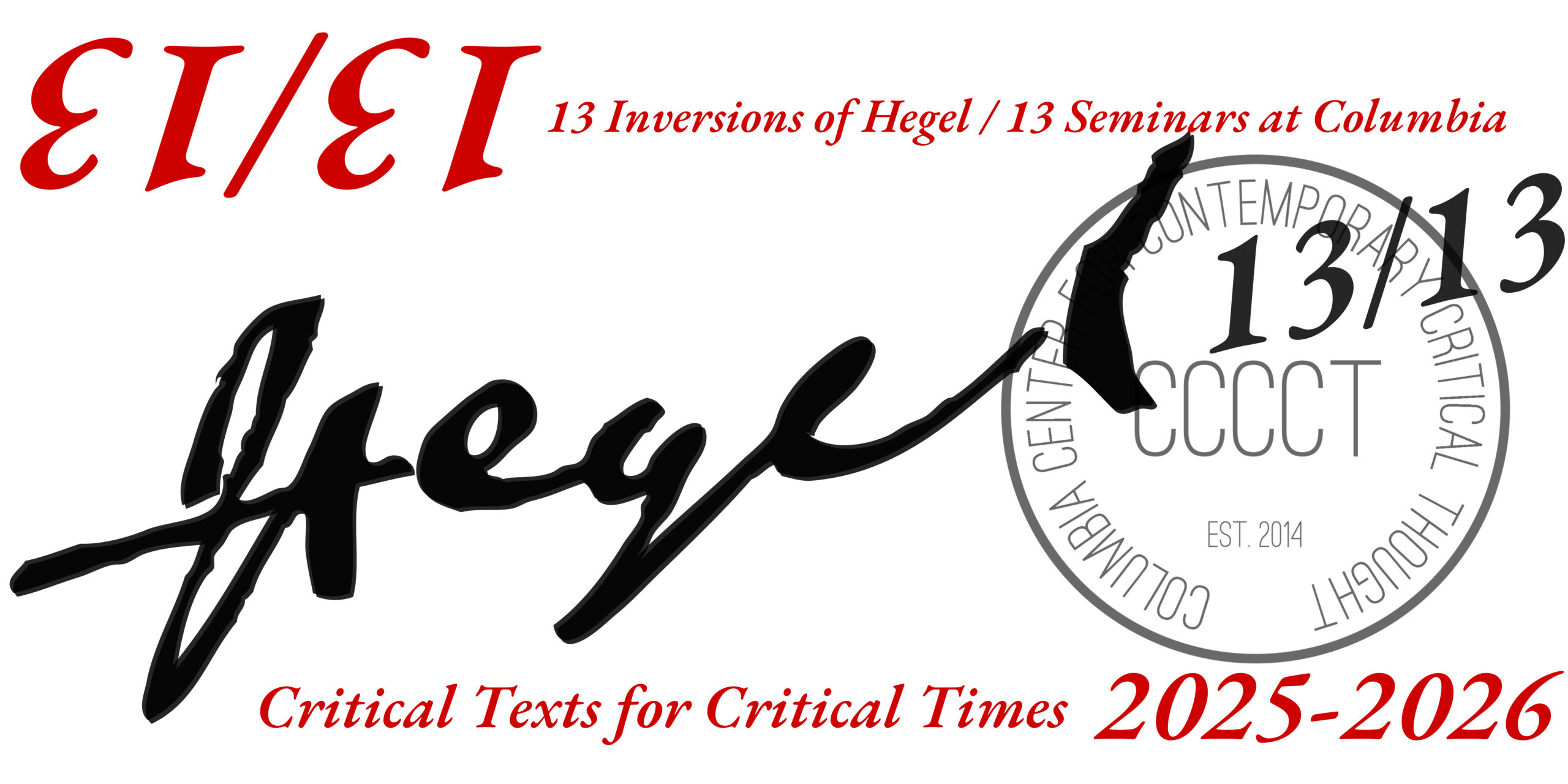Discussion with Jean-Baptiste Vuillerod on Louis Althusser:
Lecture on the Early Louis Althusser
Lecture on Hegel and the Heritage Foundation:
In 1950, the young French philosopher Louis Althusser published a damning article titled “Le retour à Hegel” (“The Return to Hegel”), a brilliant and virulent critique of his senior peer Jean Hyppolite’s writings on Hegel and of the general Hegelian tendency in post-war French philosophy. At the time, Hegelianism was all the rage in Paris. Hyppolite had just published his major treatise on Hegel’s Phenomenology of Spirit, titled The Genesis and Structure of the Phenomenology of Spirit (1947), which was well received and widely used by young French philosophers and students, after having produced the first major French translation of Hegel’s Phenomenology of Spirit in 1939.
Althusser portrayed the return to Hegel as a historical tendency among French “bourgeois” philosophers—both ideological and political—to mount an attack on Marx and Marxism, and to produce a revisionist reading of Marx inflected by his young Hegelianism.
Althusser’s argument presents (paradoxically) a deeply Hegelian reading of the history of French philosophy—one in which there is a learning process from the liberalism of the eighteenth century to the bourgeois conservative Hegelianism of post-war France. Althusser ultimately invites his contemporaries to make a choice between Hegel’s idealism or Marx’s materialism. He powerfully demonstrates that the renewed interest and focus on Hegel in the 1940s reflected an ideological move to the Right. Althusser writes:
This Grand Retour à Hegel is nothing more than a desperate recourse against Marx, in the specific form that revisionism takes in the final crisis of imperialism: revisionism of a fascist nature.[i]
Althusser’s article would contribute to what Jean-Baptiste Vuillerod calls the “birth of anti-Hegelianism” within 1960s French philosophy, a movement with far-reaching consequences. Only a quarter of a century after Merleau-Ponty had announced in 1946 that “Hegel is at the origin of everything great that has been done in philosophy in the last century,”[ii] Foucault would declare in his inaugural lecture at the Collège de France in 1970: “Our whole epoch, whether through logic or epistemology, whether through Marx or Nietzsche, is trying to escape from Hegel.”[iii]
This seminar is not a “return to Hegel.”
It is crucial to start this seminar series by emphasizing that the project, Inversions of Hegel 13/13, is by no means a return to Hegel. Althusser’s core point must be reiterated: there is no anodyne choice of who to read, who to study, who to discuss. Every decision we make as thinkers and actors—about who we read and name—involves a political choice with deep implications.
The fact is, our theoretical inquiries, Hegel 13/13, form part of a historical conversation and a political trajectory (in a Hegelian sense). Thus, we need to begin the inquiry by being deeply self-conscious—again, in a Hegelian way—of our implication in the current political moment.
Today, we are experiencing a historical transformation. A global counterrevolution, a wave of nationalist populist sentiment, a conservative will to power is mounting across the continents and, like lightning strike, smashing the liberal administrative state.
In this political moment, it is imperative to look back on exemplars of critical praxis that pushed history in a different direction—toward cooperation, solidarity, and emancipation. In moments like these, new philosophies and practices have emerged from sharp confrontations with ideas from the past.
It is in that spirit that we turn, in this seminar series, to the many powerful confrontations with Hegel’s system, confrontations that fueled progressive social movements over the past two centuries.
The challenge, then, is to return to those thinkers who drew inspiration and sought to build on or demolish the Hegelian systematic edifice.
In this introductory session, the task is to be self-conscious about what we are doing and cautious, as Althusser warned us, about how our effort fit in the broader historical trajectory of critique and praxis.
Core Readings
Louis Althusser, « Le retour à Hegel. Dernier mot du révisionnisme universitaire » [1950], p. 243-260, dans Écrits philosophiques et politiques, t. I, éd. par François Matheron (Paris: Stock-IMEC, 1994).
Bruno Bosteels, “Hegel in America,” in Religion, Politics, and the Dialectic: Hegel and the Opening of the Infinite, eds. Clayton Crockett, Creston Davis, and Slavoj Žižek (New York: Columbia University Press, 2009).
Jean-Baptiste Vuillerod, La Naissance de l’anti-hégélianisme. Louis Althusser et Michel Foucault, lecteurs de Hegel(Paris: ENS Éditions, 2022).
Naomi Klein and Astra Taylor, “The Rise of End Time Fascism,” The Guardian, April 13, 2025. Available at https://www.theguardian.com/us-news/ng-interactive/2025/apr/13/end-times-fascism-far-right-trump-musk.
Dylan Riley, “Reflections on an Inverted Revolution,” The Ideas Letter, May 1, 2025. Available at https://www.theideasletter.org/essay/reflections-on-an-inverted-revolution/.
Alberto Toscano, Late Fascism: Race, Capitalism and the Politics of Crisis (New York: Verso, 2023).
Additional Readings
Louis Althusser, Lénine & la philosophie, suivi de Marx & Lénine devant Hegel (Paris: Maspéro, 1975)
Louis Althusser, “Lenin before Hegel,” in Lenin and Philosophy and Other Essays, trans. Ben Brewster (New York: Monthly Review Press 1971), available at https://www.marxists.org/reference/archive/althusser/1969/lenin-before-hegel.htm
Notes
[i] Louis Althusser, « Le retour à Hegel. Dernier mot du révisionnisme universitaire » [1950], dans Écrits philosophiques et politiques, t. I, éd. par François Matheron (Paris: Stock-IMEC, 1994), p. 243-260, p. 256 (emphasis in original); see also Jean-Baptiste Vuillerod, La Naissance de l’anti-hégélianisme. Louis Althusser et Michel Foucault, lecteurs de Hegel (Paris: ENS Éditions, 2022), p. 120-130.
[ii] Maurice Merleau-Ponty, « L’existentialisme chez Hegel » [1946], dans Œuvres, éd. par Claude Lefort (Paris: Gallimard, 2010), p. 1324, cité dans J.-B. Vuillerod, La Naissance de l’anti-hégélianisme, p. 11.
[iii] M. Foucault, L’ordre du discours. Leçon inaugurale au Collège de France, prononcée le 2 décembre 1970 (Paris: Gallimard, 1971), p. 74 ; voir J.-B. Vuillerod, La Naissance de l’anti-hégélianisme, p. 13 ; Pierre Macherey, « Foucault serait-il sorti de Hegel ? », dans Alain Brossat et Daniele Lorenzini (dir.), Foucault et… Les liaisons dangereuses de Michel Foucault (Paris: Vrin, 2021), p. 9-34.
